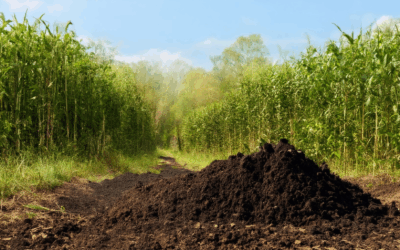Exploring the world of sustainable gardening has never been more exciting than when you discover the transformative power of biochar. For those who haven’t heard of it yet, biochar is a revolutionary substance derived from organic materials that has gained traction for its ability to enhance soil health and promote sustainable practices. While it may seem like a new concept, biochar has been used for centuries in various cultures, making it a fascinating topic for modern gardeners seeking eco-friendly solutions. In this article, we’ll dive into the pros and cons of biochar, its environmental impact, and how it can play a vital role in your gardening efforts. Whether you’re looking to reduce chemical use, improve soil fertility, or contribute to carbon sequestration, biochar offers a unique approach to sustainable gardening. Join us as we uncover the benefits, challenges, and everything you need to know about incorporating biochar into your garden.

Downsides of Biochar
Biochar, while offering numerous benefits, does have some potential drawbacks:
- Reduction in Crop Yields:** Biochar can absorb water and nutrients from the soil, potentially leading to reduced crop yields, especially in certain conditions.
- Impact on Pesticide Efficacy:** Biochar can sorb pesticides and herbicides, reducing their effectiveness and potentially increasing pest populations.
- Heavy Metal Contamination:** Some biochars may contain harmful levels of heavy metals, posing risks to soil health and plant growth.
- Pest Attraction:** Biochar can alter soil structure and chemistry, sometimes attracting pests like nematodes.
- Cost and Availability Issues:** High-quality biochar can be costly and may not always be readily available, limiting its accessibility for smaller-scale users.
It’s important to source biochar from reputable producers to minimize these risks and maximize its beneficial effects. For more information on sustainable practices and high-quality biochar production, visit Pyrolysium .
Is Biochar Environmentally Friendly?
Biochar is considered environmentally friendly due to its ability to sequester carbon and promote sustainable practices.
Carbon Sequestration
Biochar effectively traps carbon, contributing to carbon neutrality. According to the IPCC, each ton of biochar can capture approximately 12,000 to 24,000 kilograms of CO2, aiding in climate change mitigation efforts.
Waste Management
Produced through pyrolysis, biochar transforms organic waste into a valuable resource, reducing landfill dependency and preventing methane emissions from decomposing organic material.
Sustainable Soil Practices
Biochar enhances soil fertility by improving structure and nutrient retention, promoting eco-friendly agricultural practices that reduce reliance on harmful chemical fertilizers.
Energy Efficiency
While biochar production requires energy, using biogas from the same process as a renewable energy source ensures a positive energy balance, supporting sustainable practices.
Scalability and Regional Adoption
Biochar’s potential is significant, offering a scalable solution across various regions to mitigate environmental impacts associated with traditional farming methods.
Overall, biochar serves as an environmentally beneficial option, aligning with sustainable goals by reducing waste, capturing carbon, and fostering healthier soils.

Is Biochar Good for a Garden?
Biochar, produced through pyrolysis of organic materials, offers numerous benefits for garden soils. Its porous structure enhances water retention and nutrient absorption, improving soil health and plant growth.
- Soil Improvement: Biochar increases soil porosity, allowing better root penetration and oxygen access, while also boosting water retention capabilities.
- Nutrient Retention: It adsorbs harmful substances like pesticides and heavy metals, reducing soil contamination and enhancing safety for plants and humans.
- Microbial Activity: Biochar serves as a habitat for beneficial microorganisms, fostering a thriving soil ecosystem that supports plant growth and nutrient cycling.
- Plant Growth Enhancement: Studies indicate biochar can boost crop yields and increase resistance to diseases and environmental stresses like drought and pests.
- Carbon Sequestration: As a carbon sink, biochar helps combat climate change by storing carbon in the soil, mitigating greenhouse gas emissions.
Considerations:
- Application Balance: Excessive biochar may lead to nitrogen leaching, affecting water quality. Proper measurement and mixing with other amendments are advised.
- Regional Variability: Effectiveness can differ based on local climate and soil conditions, necessitating testing and adjustment.
Application Methods:
- Add as powder or pelletized form to soil or mixed with compost/manure.
- Incorporate into raised beds or use as mulch to retain moisture and suppress weeds.
Biochar is a valuable addition to sustainable gardening practices, offering long-term benefits for soil health and plant productivity. Consider incorporating it into your garden for healthier, more resilient plants and a more sustainable gardening environment.

Is Too Much Biochar Bad for Plants?
Biochar, a blackened charcoal-like material produced through pyrolysis of organic waste, is often praised for its benefits in improving soil health. However, using too much biochar can pose several challenges:
- Microbial Imbalance: Excessive biochar can attract too many microorganisms, potentially overwhelming plants and reducing available nutrients.
- Compaction and Water Retention: Too much biochar may cause soil to become compacted and waterlogged, restricting root growth and oxygen availability.
- pH Alteration: Biochar tends to be slightly acidic, and overuse could lower soil pH, affecting plants that require neutral or alkaline conditions.
- Nutrient Leaching: Excess biochar may lead to nutrient leaching, depriving plants of essential minerals and nutrients.
To avoid these issues, it’s important to use biochar in moderation and consider soil type, plant requirements, and application methods. Proper incorporation of biochar with complementary materials like compost can enhance benefits while mitigating potential downsides. Always refer to agricultural guidelines or permaculture resources for specific recommendations and best practices.
Why is biochar controversial?
Biochar, a blackened charcoal produced through pyrolysis of organic materials, has sparked debate due to several factors:
- Conflicting Claims of Effectiveness: While biochar is praised for its potential to sequester carbon and improve soil health, some critics question its actual impact, citing a lack of conclusive large-scale studies.
- Regulatory Hurdles: Inconsistent standards in production may lead to varying product quality, raising concerns among researchers and policymakers about reliability and safety.
- Land Use Concerns: Conversion of land traditionally used for agriculture for biochar feedstock raises fears about food security and competition for resources.
- Economic Challenges: High production costs and scalability issues limit accessibility, prompting critiques about its feasibility as a global solution.
- Environmental Trade-offs: Despite its carbon-sequestration benefits, biochar production requires significant energy inputs, questioning whether it truly achieves net-zero outcomes.
- Application Disagreements: Variability in application methods complicates understanding of its efficacy, leading to divergent opinions on optimal use practices.
These multifaceted issues contribute to the ongoing discussion about biochar’s role in sustainable practices and climate mitigation efforts.

How Long Can Biochar Keep Carbon in the Soil?
Biochar, produced through processes like pyrolysis, is a carbon-rich material derived from organic waste. Once applied to soil, biochar can effectively sequester carbon, contributing to carbon sequestration efforts.
- Long Residence Time: Biochar typically remains in the soil for an extended period due to its stability. Research indicates a mean residence time of approximately 2000 years, making it a durable solution for carbon storage.
- Soil Amendment Benefits: As a soil amendment, biochar enhances soil structure and fertility, promoting plant growth and reducing greenhouse gas emissions.
- Carbon Sequestration Impact: By incorporating biochar into agricultural soils, farmers can actively contribute to carbon capture, supporting sustainable land management practices.
The longevity of biochar in the soil underscores its potential as a valuable tool for both environmental sustainability and agricultural productivity. Its ability to store carbon for centuries makes it a significant contributor to carbon sequestration initiatives, fostering a healthier planet and more resilient ecosystems.




0 Comments